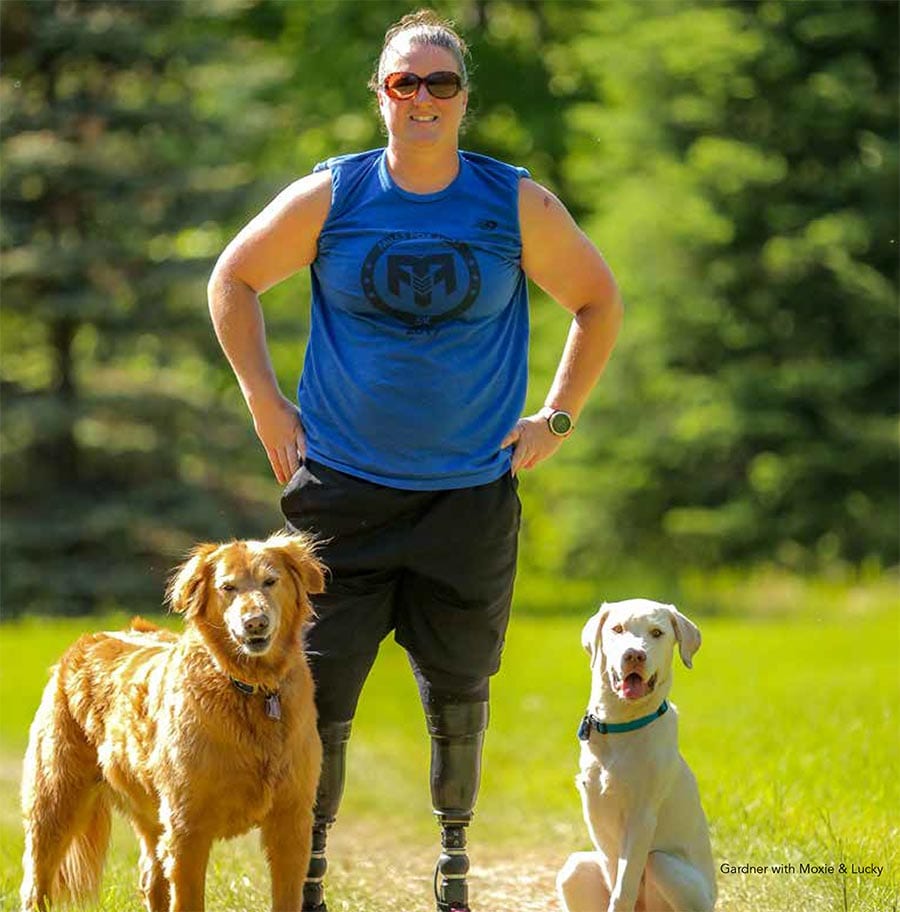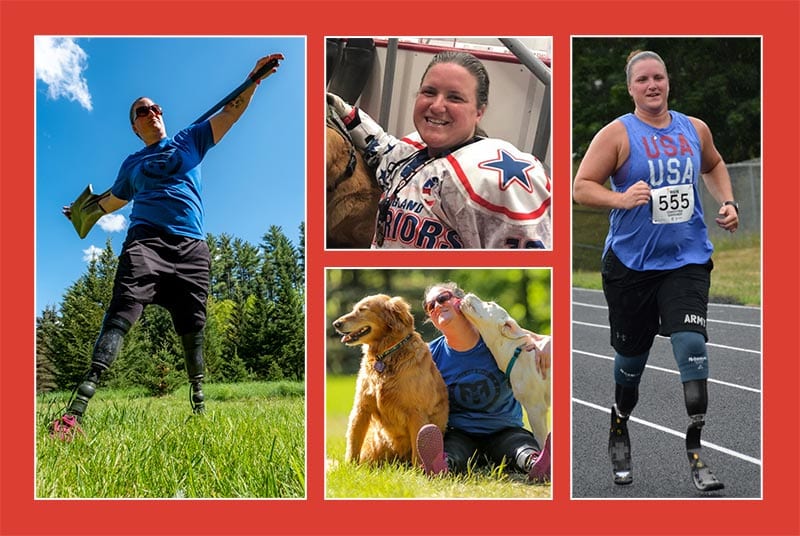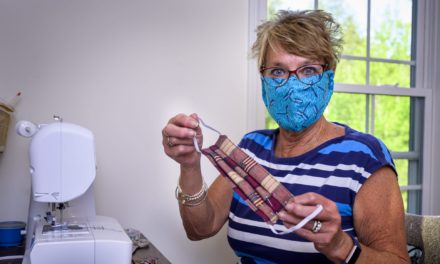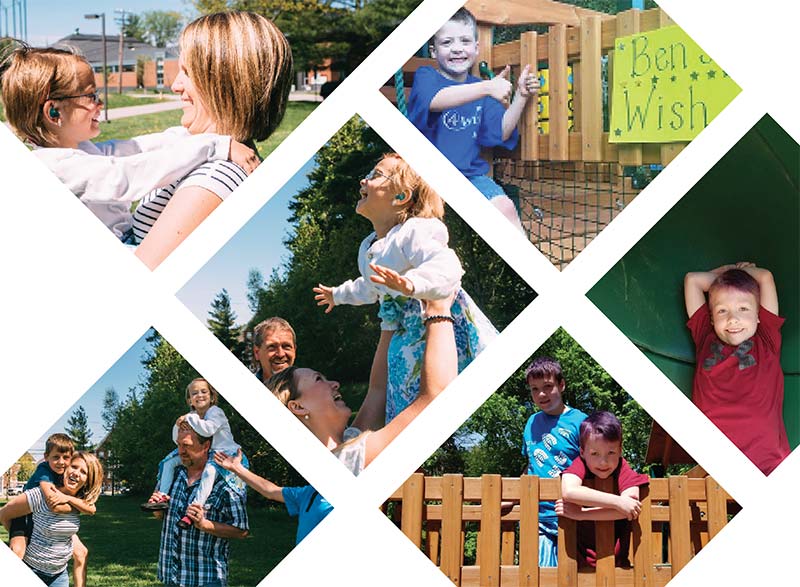Christy Gardner’s new way to represent her country
Written by David Muise | Photography by Brewster Burns
Christy Gardner is most assuredly a tough Maine woman- tough enough to serve as a sergeant in the U.S. Army. And now she is co-captain of the U.S. National Women’s Sled Hockey Team. This rugged league allows full checking on the ice, and its tough players thrive on it.
Sled hockey
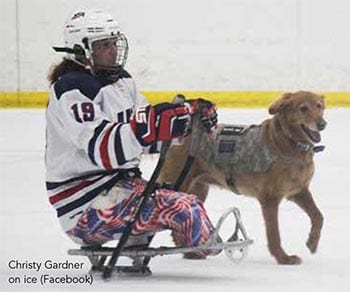 Spectators will immediately recognize the kinship of sled hockey with traditional ice hockey. It’s played on the same ice and incorporates most of the same rules. The biggest difference is that the players are strapped into sleds equipped with two ice hockey skates. Each player has two sticks abutted at on e end with metal spikes; the players use these to propel themselves on the ice. The opposite ends of the sticks are affixed with hockey blades, for shooting or passing the puck. And the players are likely to engage, as aforementioned, in the familiar checking. Ah yes, the checking… “I love this sport,” gushes Gardner. “It gives me the opportunity to be part of a unit again, and to hit someone, legally.” Being “part of a unit again” references Gardner’s time in the U.S. Army. To “hit someone, legally” references the full contact sport of sled hockey. Gardner’s participation in the sport is a result of a long journey that began with a mission in the Korean Demilitarized Zone (DMZ).
Spectators will immediately recognize the kinship of sled hockey with traditional ice hockey. It’s played on the same ice and incorporates most of the same rules. The biggest difference is that the players are strapped into sleds equipped with two ice hockey skates. Each player has two sticks abutted at on e end with metal spikes; the players use these to propel themselves on the ice. The opposite ends of the sticks are affixed with hockey blades, for shooting or passing the puck. And the players are likely to engage, as aforementioned, in the familiar checking. Ah yes, the checking… “I love this sport,” gushes Gardner. “It gives me the opportunity to be part of a unit again, and to hit someone, legally.” Being “part of a unit again” references Gardner’s time in the U.S. Army. To “hit someone, legally” references the full contact sport of sled hockey. Gardner’s participation in the sport is a result of a long journey that began with a mission in the Korean Demilitarized Zone (DMZ).
The accident
“I actually don’t remember that day,” says Gardner. “I just remember meeting with the trauma doctors who explained everything that had happened.” What did happen? Gardner was driving a U.S. Army Humvee as part of a peacekeeping mission in South Korea’s DMZ. Suddenly, an accident occurred, gravely injuring her. “I had skull and facial fractures, a traumatic brain injury, and spinal cord injury,” explains Gardner. “I eventually had elective amputations of both legs below the knee, after the condition of my feet degraded. It was related to the spinal cord injury and lack of sensation and circulation below the knees.” For Gardner, losing her legs was not the hardest part of her journey; coming home wounded, in great need of assistance, was what loomed darkest over her. “I was an elite athlete and independent before this happened,” says Gardner. “When I came home, I was completely dependent on everyone for everything. That was the hardest part.” Gardner longed to find a place where she could experience that thrill of action, where she could use her athletic skill to be part of a team. She would find it through the wisdom of fellow veterans to explore adaptive sports.
Reconnecting with sport
“I loved playing sports in high school and college,” recalls Gardner. “I ended up playing lacrosse and field hockey since my parents were afraid I’d get hurt playing ice hockey.” Gardner was so good at these replacement sports that she received a scholarship to play them at C.W. Post College at Long Island University. Upon graduation, Gardner entered the United States Army. “After I was injured in the Army, I believed the many doctors who told me that I wouldn’t be able to do a lot of things,” explains Gardner. “It wasn’t until I listened to other veterans that I decided to attend an adaptive sports camp called ‘Fun in the Sun Day,’ at Mount Sunapee in New Hampshire.” 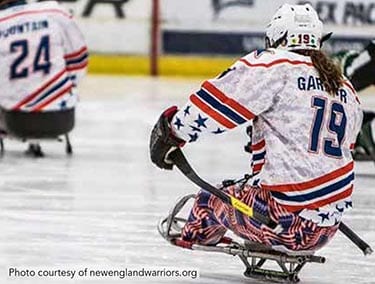 Reconnecting with her love of sports was a real turning point for Gardner. In the aftermath of her injury, she felt lost at times and missing something for which she longed- the physicality of action and the camaraderie of team sport. “After that first camp, I went to another: the VA New England winter sports camp, also at Mount Sunapee. We learned to ski or snowboard each day, and were introduced to a new sport each evening- kayaking in the pool, wheelchair basketball, and sled hockey. At hockey, I was only on the ice for about 20 minutes but I fell in love with it. It was a fast-paced and competitive sport where I could be a part of a team again.” Gardner explains that finding sled hockey has been incredibly important to her recovery. “It’s given me purpose and direction, as well as physical exercise and mental health boosts from being at such a high level of play and being an asset to the team,” she says.
Reconnecting with her love of sports was a real turning point for Gardner. In the aftermath of her injury, she felt lost at times and missing something for which she longed- the physicality of action and the camaraderie of team sport. “After that first camp, I went to another: the VA New England winter sports camp, also at Mount Sunapee. We learned to ski or snowboard each day, and were introduced to a new sport each evening- kayaking in the pool, wheelchair basketball, and sled hockey. At hockey, I was only on the ice for about 20 minutes but I fell in love with it. It was a fast-paced and competitive sport where I could be a part of a team again.” Gardner explains that finding sled hockey has been incredibly important to her recovery. “It’s given me purpose and direction, as well as physical exercise and mental health boosts from being at such a high level of play and being an asset to the team,” she says.
Warrior
That first 20 minutes on the ice left Gardner with a deep desire to hone her skills at sled hockey. That rush, the thrill, the ability to achieve and compete again drove her to practice independently toward a goal. “In the beginning I was terrible, but I trained on my own for about six months and was invited to join the U.S. Women’s team after attending a camp put on by USA Hockey,” says Gardner. “I still don’t think I was very good the first couple of years, but the girls on the team were amazing and taught me everything they could.” About this time, Gardner began playing for the USA Warriors team out of Walter Reed National Military Medical Center in Bethesda, Maryland, where she had been recovering from her injuries and going through rehabilitation. At this point, Gardner was on two teams and beginning to define her skills on the ice. As her recovery improved and she made her way back to Maine, Gardner continued playing for USA Warriors until she got some unfortunate news. “USA Hockey rules require a player to play on a club within 100 miles of their home,” says Gardner. “Turns out there wasn’t one within 100 miles of Lewiston Auburn, so I had to start one.” Gardner’s team, the New England Warriors, is officially based in LA. She and fellow veteran, Ian Ramsdell, founded it in 2015. The Warriors offer veterans in the area the same opportunity to engage in sled hockey and reconnect with a new, different kind of unit. The team practices out of Norway Savings Bank Arena in Auburn, but holds its home games at the Ice Vault in Hallowell, so patients at the Togus VA Medical Center can easily attend the games. The big home match this year will take place on Nov. 17 at the Ice Vault; all are welcome to come cheer on the local team, says Gardner. To learn more, visit their website or follow them on Facebook for updates on games, scrimmages, and clinics.*
Representing her country again
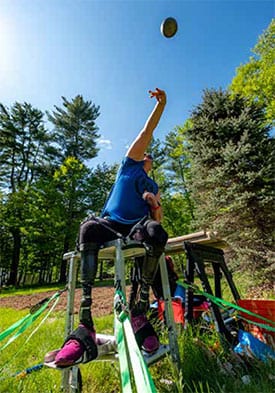 In addition to playing with her local team, the New England Warriors, Gardner also represents her country as co-captain of the Women’s National team that competes in the World Championships.“Being able to wear the USA jersey is major!” says Gardner excitedly. “To be a part of that unit, and bring pride to myself and our nation, has been extremely important and rewarding.” Gardner has won two World Championships with the team (both over Canada) and she names these as the highlight of her sled hockey career, though she follows it up with a surprising and close second. “Aside from the two Worlds, I’d have to say, I loved it when some Canadian fans called me ‘team USA’s enforcer,’” says Gardner. “I wear that badge with honor because I’m unafraid and strong on the ice always.”
In addition to playing with her local team, the New England Warriors, Gardner also represents her country as co-captain of the Women’s National team that competes in the World Championships.“Being able to wear the USA jersey is major!” says Gardner excitedly. “To be a part of that unit, and bring pride to myself and our nation, has been extremely important and rewarding.” Gardner has won two World Championships with the team (both over Canada) and she names these as the highlight of her sled hockey career, though she follows it up with a surprising and close second. “Aside from the two Worlds, I’d have to say, I loved it when some Canadian fans called me ‘team USA’s enforcer,’” says Gardner. “I wear that badge with honor because I’m unafraid and strong on the ice always.”
Unafraid and strong
These words pretty much typify all the ladies on the U.S. National Women’s Sled Hockey team. Being on the team comes with grueling expectations: six days a week of training, workouts, and required sessions with local clubs. “Playing at this level is amazing,” says Gardner. “The ladies I play with come from all sorts of backgrounds and from all across the nation. We range from 14 years old to women in their 40s. Some have congenital conditions and others of us acquired our injuries or illnesses later in life.” The team holds tryouts annually, in July or August. Most prospects start as the one if not the only female on their local teams. They hope to make the national team, which is the only all female squad in the nation.
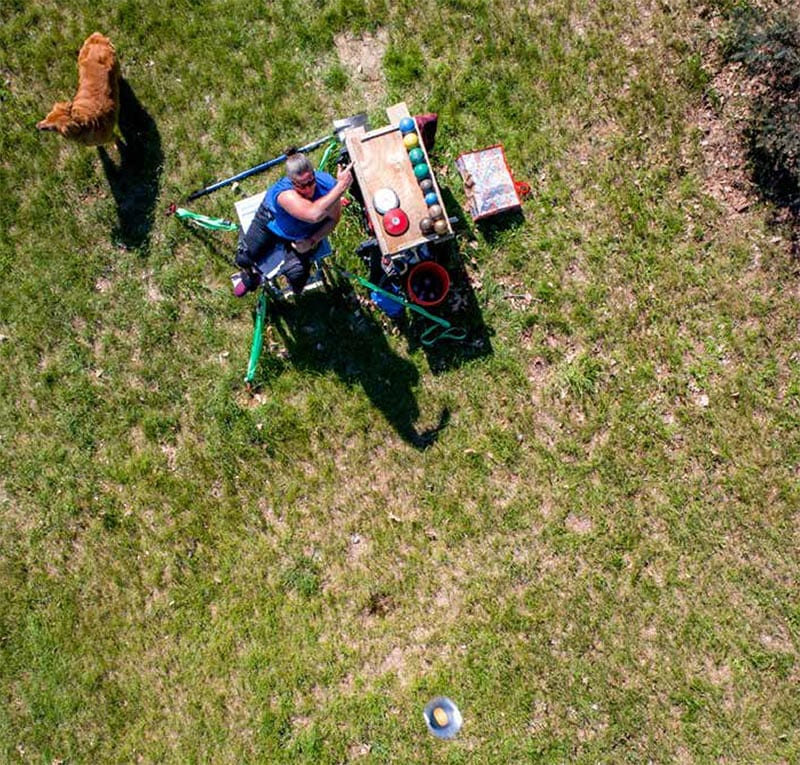
Top of her game
Gardner’s skills on the ice have developed quickly and broadly. During her career, she reports having played every position on the ice- center, wing, defense, and even some time in net when the team’s goalie was injured. This versatility and general athletic prowess has taken Gardner to new heights in her athletics. She had spent time as a volunteer at Varney’s Labs in Turner where she helped raise puppies, but she has since left to focus full-time on her athletic career. Playing on multiple sled hockey teams and enduring the rigorous training that goes with them, she is also expanding her sport participation. “I am striving toward making the USA Track & Field Team for the Tokyo 2020 Paralympics, competing in shot put and discus,” says Gardner. “I’m by far the best in the nation, but I have a ways to go to reach the Paralympics, though I did take first place in both events in a meet last fall in Italy.”
Connecting the dots
Gardner thrived in the military. “My grandfather and uncles were in the Marines, so the option to be in the military was always in my head,” says Gardner. She found the same type of camaraderie and excitement that she had earlier in life on the sports field. When she was injured and had to rediscover that part of herself, she turned back to sport. It’s almost as if Gardner and sled hockey ran headlong into each other and they’ve been propelling each other forward ever since. “The military squad, or unit attitude, really focuses on doing everything you can to accomplish the mission while leaving no one behind,” says Gardner. “That helps a lot in hockey because we all have the same mentality. Sled hockey is full checking and, while it’s not nearly as deadly as serving, we sacrifice our bodies in an attempt to win. Most of us pass the puck unselfishly to accomplish the ultimate goal of winning the game.”
Just as in the military, Gardner continues to work selflessly to accomplish a goal. She is very proud of representing her country- both during her time serving and now as a co-captain of the U.S. Women’s National Sled Hockey Team.
*New England Warriors Sled Hockey
https://www.newenglandwarriors.org/
https://www.facebook.com/NEwarriorssledhockey/
https://www.instagram.com/newarriors/
U.S. National Women’s Sled Hockey
https://teamusa.usahockey.com/womensledhockey/
